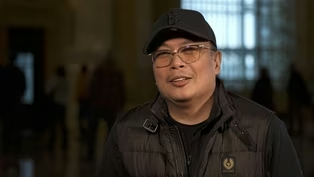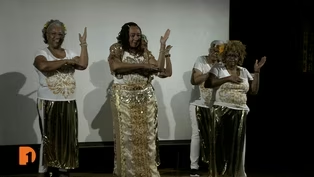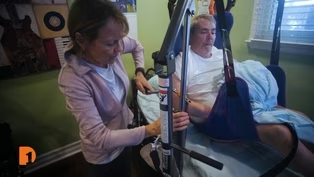
Local agency leaders discuss the needs of older adults and their caregivers
Clip: Season 10 Episode 16 | 7m 31sVideo has Closed Captions
The “Caring for Caregivers” event featured important conversations on helping older adults age well.
Detroit PBS partnered with St. Patrick Senior Center for a public event about the challenges and triumphs of caregiving. The panel discussion at the "Caring for Caregivers: The Art of Aging Well" event was moderated by American Black Journal contributor Trudy Gallant-Stokes and covered caregiver resources, the power of caregivers advocating for themselves, and more.
Problems playing video? | Closed Captioning Feedback
Problems playing video? | Closed Captioning Feedback
One Detroit is a local public television program presented by Detroit PBS

Local agency leaders discuss the needs of older adults and their caregivers
Clip: Season 10 Episode 16 | 7m 31sVideo has Closed Captions
Detroit PBS partnered with St. Patrick Senior Center for a public event about the challenges and triumphs of caregiving. The panel discussion at the "Caring for Caregivers: The Art of Aging Well" event was moderated by American Black Journal contributor Trudy Gallant-Stokes and covered caregiver resources, the power of caregivers advocating for themselves, and more.
Problems playing video? | Closed Captioning Feedback
How to Watch One Detroit
One Detroit is available to stream on pbs.org and the free PBS App, available on iPhone, Apple TV, Android TV, Android smartphones, Amazon Fire TV, Amazon Fire Tablet, Roku, Samsung Smart TV, and Vizio.
Providing Support for PBS.org
Learn Moreabout PBS online sponsorship(upbeat music) - My mother had Alzheimer's for 10 years, and my brother who's in the audience and I were caregivers, and she used to say to me sometimes, "You're really good at this, you know, you should go into business."
I said, "No mom, this is because I love you.
I enjoy doing this for you.
I don't know if I'd be able to do this as a job."
But it's very important to have.
And that's what you see in the audience here tonight, people who raise their hands said they're caregivers because those are people that are in their lives and people that they love.
And so you step up, you do what you have to do.
Satrice, tell me a little bit more about St.
Patrick and some of the history.
It's a rich history here in the services today.
- Definitely.
St.
Patrick Senior Center, we're over 50 years old.
It was started by Sister Mary Watson.
We have a variety of program.
We're one of the larger health and wellness centers with the support of Detroit Area Agency on Aging of course.
(group laughing) (audience applauding) They do a lot for us.
We wouldn't be who we are without them.
So we have a number of programs.
Our congregate meal program where we cook food from scratch.
We have bunches of exercise, dance classes.
We even are teaching older adults digital literacy.
So I have digital navigators who are seniors trained and we're teaching VR, we're doing AI, we're in the community.
We also have started with workforce development training because we know that many older adults are being forced to get back into the workforce for whether it's self-fulfillment or just needing that extra money, even if it's to pay for your healthcare.
So we are training older adults to be entrepreneurs and community health workers.
- Okay, so Ron, since you're right next to Satrice, talk about that, you know, the interaction, and how you, DAAA as they say, how you're able to help others in the community.
- Yeah, DAAA and it is easy to help a entity such as St.
Pat's because of the commitment and the heart and just the love in which Satrice pours out in which you could tell carries down to the rest of her team and to the services in which they provide and how they connect to the community.
So it makes it very easy.
But at DAAA, we've been around for 45 years, and it's been our mission to try to do what we can to allow individuals to age in the community with age, I mean with grace and dignity.
And we've done that by creating a system as far as a network of partners that allow us to provide what I say as a continuum of care.
And that continuum of care essentially allows individuals to come to facilities like St.
Pat's in which you can do, I recall one of the first times I got to Detroit, I came here and tried to do a line dancing.
And so that's part of what Satrice has on me.
She shows that video every now and then when she comes with asks, and so, but, you know, you could come in and do line dance and you could participate in the VR programs.
You could participate and play some pool, get a haircut.
I mean, you could really do things as far as socialization.
But then the continuum of care that we provide goes all the way to if you're homebound, if you need assistance in the home, in which we can send someone into your home to allow you to avoid going into a nursing facility and to receive care there.
- I think a lot of caregivers feel invisible because they are so involved and so wrapped up in trying to take care of that loved one.
But what are some ways or organizations that can help them feel seen and feel supported?
Anybody can answer that.
- One of the things that we like to do is really talk around advocacy.
And we can use that word in a number of ways.
So we really encourage caregivers that come to us to be their own self-advocate.
And we really go through workshops.
We partner with a number of organizations.
But the other part of that is also being an advocate on various levels on the state level, on a political level, on a policy level.
So also giving those skills out to the community at large, really to have conversations, really to get out and to tell your story.
It is so important to tell your story as a caregiver because that's where change happens.
And so, not to be afraid of telling that story, but just making sure when you get out there, tell your story, keep telling your story, say it over and over again.
Write it down, email it, do all those things because that's really what we really press for change to happen.
- Ron, do you have- - I would say that it's this multi-pronged approach, in advocacy, it has to occur because again, caregivers are the backbone of our healthcare system.
And the appropriate resources need to be directed to caregivers.
And I say it as far as whether it's with the employer as far as EAP programs or if it's with the ability to reimburse or to provide payments to caregivers if it's increasing the rate of payment to direct care workers.
And, you know, there's a number of policy considerations.
And the other one I would say is like a tax credit for caregivers.
And so there's a number of policy considerations that should be promoted and needs to be advocated for.
And the greatest voice is your voice.
And it's, you know, and you have to speak to your legislators and talk to those that can influence policy.
But I would also say to recognize the realities of what's occurring in the real world and what's happening is that we work with a number of partners and we also have, one of our team members is here today as far as Crystal White, as far as providing caregiving services.
And those caregiver services are allowed to help educate and to train caregivers through programs such as Trualta.
And then it's also where we can do intensive assessments to help caregivers understand where they're at and what their needs may be.
And also we can help direct them and to connect them to the appropriate resources.
And then also we just try to provide support to support groups.
And so I would say that as a caregiver, that you really need to make certain that you take care of yourself and that you spend time for yourself.
And that also, one of the things I continue to hear is that you don't beat up on yourself or don't feel guilty about if there's a bad day, or if there's a bad moment, because we all have those in life and we will experience them.
- Satrice, if you could just wave a magic wand and change one thing about how we support caregivers, what would you do?
- I would say just trying to find ways to make it easier.
You know, here at St Pat's, I'm really into technology, but also finding ways that you can use technology to simplify your life.
So ways to stay connected.
Maybe you can't get out, but you can get on Zoom and be in the support group or get in a class.
Maybe you're having trouble trying to get your groceries and you don't have time to leave and, you know, you can't take groceries to your mother because you're still at work.
But maybe we can use something like Kroger Boost and have our groceries delivered to make it easier.
So there's ways that we can do it, and it is the wave that's coming.
Video has Closed Captions
Clip: S10 Ep16 | 1m 25s | Detroit resident John Galvan participates in One Detroit’s “Destination Detroit” series. (1m 25s)
Divine Divas dance troupe perform at St. Patrick Senior Center
Video has Closed Captions
Clip: S10 Ep16 | 1m 22s | A performance featuring the Divine Divas dance troupe at St. Patrick Senior Center. (1m 22s)
A Northville couple’s caregiving challenges are nearing the breaking point
Video has Closed Captions
Clip: S10 Ep16 | 12m 8s | A couple is facing emotional, physical and financial challenges related to caregiving. (12m 8s)
Providing Support for PBS.org
Learn Moreabout PBS online sponsorship
- News and Public Affairs

Top journalists deliver compelling original analysis of the hour's headlines.

- News and Public Affairs

FRONTLINE is investigative journalism that questions, explains and changes our world.












Support for PBS provided by:
One Detroit is a local public television program presented by Detroit PBS


